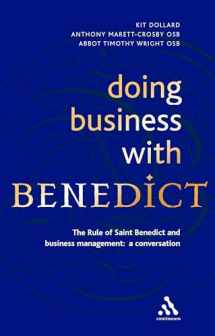
Doing Business With Benedict: The Rule of Saint Benedict and Business Management: A Conversation
ISBN-13:
9780826467010
ISBN-10:
0826467016
Author:
Kit Dollard, Anthony Marett-Crosby, Abbot Timothy Wright
Publication date:
2003
Publisher:
Continuum Intl Pub Group
Format:
Paperback
215 pages
FREE US shipping
Book details
ISBN-13:
9780826467010
ISBN-10:
0826467016
Author:
Kit Dollard, Anthony Marett-Crosby, Abbot Timothy Wright
Publication date:
2003
Publisher:
Continuum Intl Pub Group
Format:
Paperback
215 pages
Summary
Doing Business With Benedict: The Rule of Saint Benedict and Business Management: A Conversation (ISBN-13: 9780826467010 and ISBN-10: 0826467016), written by authors
Kit Dollard, Anthony Marett-Crosby, Abbot Timothy Wright, was published by Continuum Intl Pub Group in 2003.
With an overall rating of 3.8 stars, it's a notable title among other
books. You can easily purchase or rent Doing Business With Benedict: The Rule of Saint Benedict and Business Management: A Conversation (Paperback, Used) from BooksRun,
along with many other new and used
books
and textbooks.
And, if you're looking to sell your copy, our current buyback offer is $1.03.
Description
St. Benedict (c.480-547) wrote a rule book that for fourteen centuries has influenced monastic life throughout the world and continues to guide, spiritually and practically, the Benedictine order. Ampleforth Abbey in Yorkshire has recognised the power of the Rule for guiding life and work in the modern world and has been running courses for business people that explore the value of St. Benedict's teaching. In this original and inspirational book the authors share the vision of the Rule on the enduring subjects of leadership, relationships and the management of change and stability. Managing people starts with the ability to recognise and value difference. Businesses can best flourish in the long term by being formed as communities based on respect, trust and support. Clear and imaginative leadership is the key. The Rule provides a range of roles that the Abbot as leader adopts such as Exemplar, Shepherd, Healer and Steward. Leaders and managers can learn that the embodiment of virtues such as mercy, prudence and discretion can have a great and powerful influence in their organizations. Benedict's vision of a community is one where the skills and gifts of people are properly recognized and given their full opportunity to be realised for the benefit of all. However central to the Rule is Benedict's thoroughgoing realism about people's propensity not only for doing wrong but for getting things wrong. How companies act in these situations is perhaps the true test of their ability to thrive in the long-term. Managing permanent, rapid change is the ultimate task for business from now on. The Rule of St. Benedict has been helping the Benedictines to successfully enable and manage change for over a thousand years. The Rule's stress on realism, vision and perseverance in the context of strong communities provides businesses large and small with a way forward to survival and success.


We would LOVE it if you could help us and other readers by reviewing the book
Book review

Congratulations! We have received your book review.
{user}
{createdAt}
by {truncated_author}


